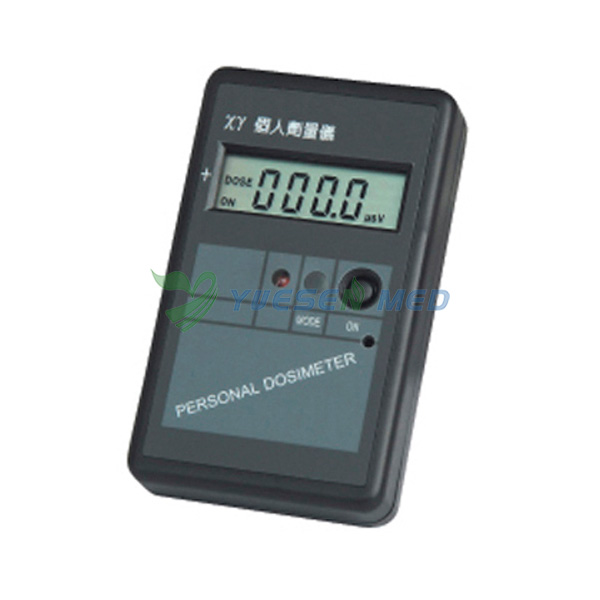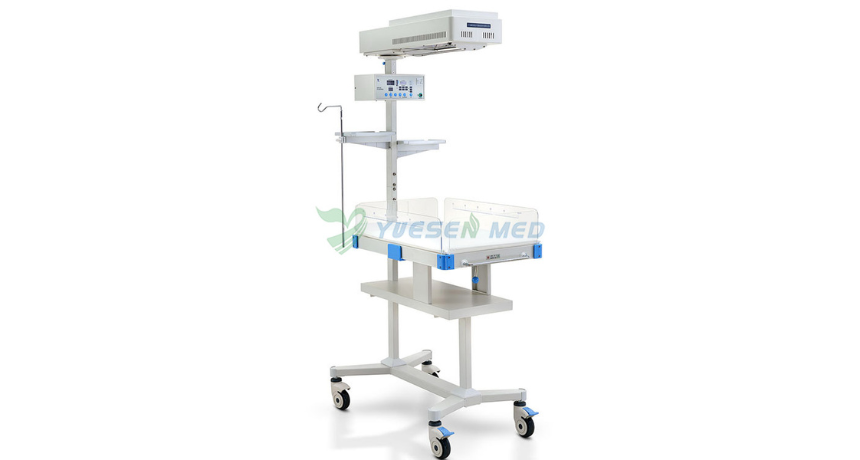Hot Products
YSX500D 50kW DR system set up and put into service in Cambodia.
YSENMED YSX500D 50kW digital x-ray system has been successfully set up and put into service in a hospital in Cambodia.
YSX056-PE serving as a vehicle-mounted x-ray in the Philippines
YSX056-PE 5.6kW portable x-ray unit has been adapted to fit on a truck, to provide mobile x-ray examination service for remote communities in the Philippines.
X Ray Machine To Zimbabwe
x ray machine, 50KW x ray machine
Microscope To Malawi
Achromatic objectives: 4X、10X、40X(S), 100X(S、Oil) Wide field eyepiece: WF10X(WF16X for option) Eyepiece head: Sliding binocular head inclined at 45° Stage: Double layer mechanical stage size 140X140mm, moving range 75X45mm Focusing: Coaxial coarse and
Guardians of Radiation: Understanding X-ray Dosimeters in Healthcare
Views : 2439
Update time : 2023-10-31 17:18:40
Radiation is a powerful force that, when harnessed responsibly, has paved the way for countless medical miracles. One of the key tools in the safe use of radiation is the X-ray dosimeter. In this article, we will unravel the mystery behind these guardians of radiation, exploring their significance in healthcare and how they ensure both patients and healthcare professionals are shielded from harm.

What is an X-ray Dosimeter?
Let's start at the basics. An X-ray dosimeter is a small yet vital device used in healthcare settings to measure the absorbed dose of ionizing radiation. Think of it as a guardian, keeping a watchful eye on the amount of radiation exposure experienced by individuals.
How Does an X-ray Dosimeter Work?
X-ray dosimeters operate on simple principles. They contain specialized materials that undergo changes when exposed to radiation. These changes are then measured, providing valuable data on the amount of radiation absorbed. It's akin to a silent sentinel, meticulously recording every encounter with radiation.
Types of X-ray Dosimeters
There are various types of X-ray dosimeters, each designed for specific purposes. Some are worn as badges, ensuring healthcare workers are shielded adequately. Others are placed in the vicinity of patients during medical procedures, guaranteeing their safety without compromising accurate diagnosis.
Why are X-ray Dosimeters Vital in Healthcare?
In healthcare, precision is paramount. X-ray dosimeters play a pivotal role in maintaining this precision. By providing real-time data on radiation levels, these dosimeters enable medical professionals to adjust procedures, ensuring both accuracy in diagnosis and safety for everyone involved.
The Role of X-ray Dosimeters in Cancer Treatment
In cancer treatment, where radiation is used to target malignant cells, X-ray dosimeters are indispensable. They enable oncologists to administer the precise dosage needed to eliminate cancer cells while minimizing damage to healthy tissues. Picture it as a targeted shield, protecting the healthy and attacking the harmful.
X-ray Dosimeters: Safeguarding Our Medical Professionals
Healthcare professionals working with radiation-emitting equipment are heroes in their own right. X-ray dosimeters act as their silent companions, monitoring their exposure levels. This ensures that these heroes can continue their life-saving work without compromising their own well-being.
The Evolution of X-ray Dosimeters
Like all technology, X-ray dosimeters have evolved. From basic devices to sophisticated, data-driven tools, they have come a long way. Modern dosimeters are equipped with advanced sensors and wireless capabilities, allowing for real-time monitoring and analysis. It's a testament to human ingenuity, constantly striving for safer practices.
Common Misconceptions About X-ray Dosimeters
There are misconceptions about X-ray dosimeters that deserve clarification. One common myth is that they are only necessary in extreme medical scenarios. The truth is, dosimeters are vital in all settings where radiation is employed. Understanding this fact dispels unnecessary fears, fostering a safer environment for everyone.
Choosing the Right X-ray Dosimeter: A Guide
Selecting the appropriate X-ray dosimeter is crucial. Factors such as the type of radiation used, the environment of use, and the specific application must be considered. Fortunately, there are dosimeter experts available who can guide healthcare facilities in making the right choice. Think of them as wise mentors, ensuring the best protection possible.
Maintaining and Calibrating X-ray Dosimeters
To guarantee accuracy, regular maintenance and calibration of X-ray dosimeters are essential. This involves meticulous testing to confirm their reliability. Much like tuning a musical instrument, this process ensures that dosimeters perform optimally, providing precise data that healthcare professionals can trust.
FAQs About X-ray Dosimeters
Q1: What is the difference between a dosimeter badge and a regular badge worn by healthcare professionals?
A dosimeter badge is specifically designed to measure radiation exposure, unlike regular badges. It serves as a personalized guardian, tailored to the needs of healthcare workers dealing with radiation.
Q2: How often should X-ray dosimeters be calibrated?
X-ray dosimeters should be calibrated annually or whenever they undergo physical damage. Regular calibration guarantees accurate readings, upholding safety standards in healthcare facilities.
Q3: Are X-ray dosimeters only used in hospitals?
No, X-ray dosimeters find applications in various fields, including industrial settings where radiation is utilized. They are indispensable tools wherever precise monitoring of radiation exposure is required.
Q4: Can X-ray dosimeters protect against all types of radiation?
Different dosimeters are designed for specific types of radiation. It's crucial to use the right dosimeter for the corresponding radiation to ensure accurate measurements and adequate protection.
Q5: Is it safe for pregnant healthcare workers to wear X-ray dosimeters?
Yes, it is safe. X-ray dosimeters are designed to be worn without posing any risks, even for pregnant healthcare workers. They provide valuable data to ensure safety without endangering the wearer or their unborn child.
In conclusion, X-ray dosimeters are the unsung heroes of the healthcare industry. They operate silently, efficiently, and diligently, ensuring that the miracles of medical science involving radiation are performed with utmost precision and safety. As technology advances, these guardians evolve, becoming even more reliable in their mission to protect both patients and healthcare professionals. Understanding their significance not only fosters a safer environment but also acknowledges the remarkable contribution of these small yet mighty devices in the realm of healthcare.

What is an X-ray Dosimeter?
Let's start at the basics. An X-ray dosimeter is a small yet vital device used in healthcare settings to measure the absorbed dose of ionizing radiation. Think of it as a guardian, keeping a watchful eye on the amount of radiation exposure experienced by individuals.
How Does an X-ray Dosimeter Work?
X-ray dosimeters operate on simple principles. They contain specialized materials that undergo changes when exposed to radiation. These changes are then measured, providing valuable data on the amount of radiation absorbed. It's akin to a silent sentinel, meticulously recording every encounter with radiation.
Types of X-ray Dosimeters
There are various types of X-ray dosimeters, each designed for specific purposes. Some are worn as badges, ensuring healthcare workers are shielded adequately. Others are placed in the vicinity of patients during medical procedures, guaranteeing their safety without compromising accurate diagnosis.
Why are X-ray Dosimeters Vital in Healthcare?
In healthcare, precision is paramount. X-ray dosimeters play a pivotal role in maintaining this precision. By providing real-time data on radiation levels, these dosimeters enable medical professionals to adjust procedures, ensuring both accuracy in diagnosis and safety for everyone involved.
The Role of X-ray Dosimeters in Cancer Treatment
In cancer treatment, where radiation is used to target malignant cells, X-ray dosimeters are indispensable. They enable oncologists to administer the precise dosage needed to eliminate cancer cells while minimizing damage to healthy tissues. Picture it as a targeted shield, protecting the healthy and attacking the harmful.
X-ray Dosimeters: Safeguarding Our Medical Professionals
Healthcare professionals working with radiation-emitting equipment are heroes in their own right. X-ray dosimeters act as their silent companions, monitoring their exposure levels. This ensures that these heroes can continue their life-saving work without compromising their own well-being.
The Evolution of X-ray Dosimeters
Like all technology, X-ray dosimeters have evolved. From basic devices to sophisticated, data-driven tools, they have come a long way. Modern dosimeters are equipped with advanced sensors and wireless capabilities, allowing for real-time monitoring and analysis. It's a testament to human ingenuity, constantly striving for safer practices.
Common Misconceptions About X-ray Dosimeters
There are misconceptions about X-ray dosimeters that deserve clarification. One common myth is that they are only necessary in extreme medical scenarios. The truth is, dosimeters are vital in all settings where radiation is employed. Understanding this fact dispels unnecessary fears, fostering a safer environment for everyone.
Choosing the Right X-ray Dosimeter: A Guide
Selecting the appropriate X-ray dosimeter is crucial. Factors such as the type of radiation used, the environment of use, and the specific application must be considered. Fortunately, there are dosimeter experts available who can guide healthcare facilities in making the right choice. Think of them as wise mentors, ensuring the best protection possible.
Maintaining and Calibrating X-ray Dosimeters
To guarantee accuracy, regular maintenance and calibration of X-ray dosimeters are essential. This involves meticulous testing to confirm their reliability. Much like tuning a musical instrument, this process ensures that dosimeters perform optimally, providing precise data that healthcare professionals can trust.
FAQs About X-ray Dosimeters
Q1: What is the difference between a dosimeter badge and a regular badge worn by healthcare professionals?
A dosimeter badge is specifically designed to measure radiation exposure, unlike regular badges. It serves as a personalized guardian, tailored to the needs of healthcare workers dealing with radiation.
Q2: How often should X-ray dosimeters be calibrated?
X-ray dosimeters should be calibrated annually or whenever they undergo physical damage. Regular calibration guarantees accurate readings, upholding safety standards in healthcare facilities.
Q3: Are X-ray dosimeters only used in hospitals?
No, X-ray dosimeters find applications in various fields, including industrial settings where radiation is utilized. They are indispensable tools wherever precise monitoring of radiation exposure is required.
Q4: Can X-ray dosimeters protect against all types of radiation?
Different dosimeters are designed for specific types of radiation. It's crucial to use the right dosimeter for the corresponding radiation to ensure accurate measurements and adequate protection.
Q5: Is it safe for pregnant healthcare workers to wear X-ray dosimeters?
Yes, it is safe. X-ray dosimeters are designed to be worn without posing any risks, even for pregnant healthcare workers. They provide valuable data to ensure safety without endangering the wearer or their unborn child.
In conclusion, X-ray dosimeters are the unsung heroes of the healthcare industry. They operate silently, efficiently, and diligently, ensuring that the miracles of medical science involving radiation are performed with utmost precision and safety. As technology advances, these guardians evolve, becoming even more reliable in their mission to protect both patients and healthcare professionals. Understanding their significance not only fosters a safer environment but also acknowledges the remarkable contribution of these small yet mighty devices in the realm of healthcare.
Related News
Read More >>
 Why Do Babies Need Infant Radiant Warmers?
Why Do Babies Need Infant Radiant Warmers?
Apr .26.2025
One crucial piece of equipment in neonatal care is the infant radiant warmer. But why exactly do babies need these warmers? Let's dive into the world of infant care and explore this important topic.
 Introduction video of YSENMED YSDEN-302S Mobile Dental Chair Unit.
Introduction video of YSENMED YSDEN-302S Mobile Dental Chair Unit.
Apr .22.2025
Here we share the introduction video of YSENMED YSDEN-302S Mobile Dental Chair Unit.
 Dr. Mbumba from Gabon highly recommends YSENMED YSX500D DR system
Dr. Mbumba from Gabon highly recommends YSENMED YSX500D DR system
Apr .21.2025
YSENMED has been providing good-valued medical equipment to clinics and hospitals around the world, and we have received a lot of good feedbacks.
DR. Mbumba from Gabon has been advertising our YSX500D digital x-ray system, due to its good performance,
DR. Mbumba from Gabon has been advertising our YSX500D digital x-ray system, due to its good performance,
 What is the Difference Between an Incubator and a Radiant Warmer?
What is the Difference Between an Incubator and a Radiant Warmer?
Apr .20.2025
Two essential pieces of equipment often discussed in neonatal care are incubators and radiant warmers. But what exactly sets them apart? Let's dive into the details and explore the reasons.



